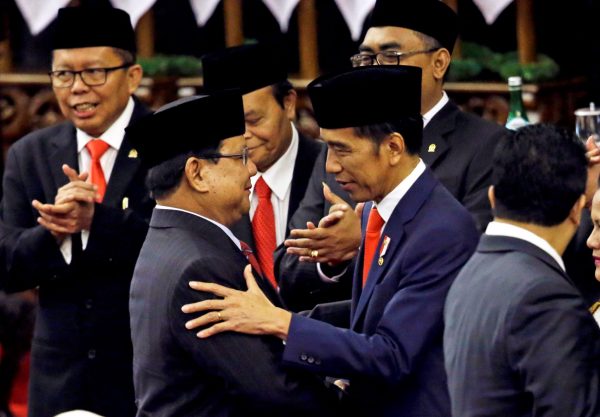In response to these polemics, Minister of State Secretariat Pratikno claims that President Joko Widodo is rejecting the revision of the current General Election Law, enacted in 2016. But members of parliament continue to deliberate the revision as the DPR enters spring recess. When exactly the DPR might approve its final passage is still unclear.
The most controversial provision discussed by the DPR is one that would cancel regional elections scheduled for 2022 and 2023. Governors, regents (Bupati) and mayors whose terms expire during this period would be required to relinquish their positions, allowing Widodo’s administration to replace them with acting regional executives to be appointed by the Ministry of Home Affairs.
Observers believe the aim of this provision is to undercut the presidential prospects of several high-profile incumbent governors on the eve of the 2024 general election. Widodo is not expected to be a contender given that he will have completed his second five-year term. The Indonesian Constitution prohibits him from running again.
One likely contender who may be affected by the provision is Jakarta Governor Anies Baswedan, who has clashed publicly with Widodo over key policies, most notably on how to best mitigate the ongoing COVID-19 pandemic. West Java Governor Ridwan Kamil may also be affected. Unlike Baswedan, he has aligned himself politically with Widodo. But Kamil failed to win endorsement from the Indonesian Democratic Party of Struggle (PDI-P) during his first gubernatorial run in 2018. Given his personal ambition to eventually run for president, he was not perceived to be a loyal team player.
If this provision is retained in the final bill, it will deny these governors an influential platform when they launch their presidential candidacies. Instead, it would benefit the possible candidacy of elite politicians aligned with Widodo, such as DPR Speaker Puan Maharani, Defence Minister Prabowo Subianto and Home Affairs Minister Tito Karnavian.
Karnavian has the authority to appoint acting executives to replace these governors when their term expires. His broad power to appoint acting executives created widespread speculation that he would appoint senior police and army officers to these positions. Karnavian was Chief of the National Police (Polri) prior to his appointment as Home Affairs Minister. During Widodo’s presidency, numerous senior Polri officers have been appointed as heads of powerful government agencies, such as the National Intelligence Agency, National Narcotics Agency and the Corruption Eradication Commission.
Appointing these officers as acting regional executives would help address the backlog of idle senior officers within the Polri and the Indonesian Armed Forces (TNI). But the plan has created concerns among pro-democracy activists, given the history of senior TNI and Polri officers to ignore, and even violate, human rights norms when they are appointed to public office, dating back to the Suharto period.
Other controversial provisions would increase the electoral threshold to require political parties to secure at least 5 per cent of votes to be seated in the DPR. Meanwhile, it retains the threshold for a party to hold at least 25 per cent of DPR seats, or 20 per cent of the national vote share from the previous general election, to nominate a presidential candidate.
This threshold is likely to eliminate any chances for new political parties that are not currently represented in the DPR to compete in the 2024 general election — like the progressive-leaning Indonesian Solidarity Party and the Islamist-leaning Indonesian People’s Wave Party, which broke away from the Prosperous Justice Party (PKS).
Meanwhile, the current presidential nomination threshold seems to privilege the PDI-P — which currently controls 22 per cent of DPR seats — over other political parties. This gives Widodo and PDI-P chairwoman Megawati Sukarnoputri an advantage to pick his future successor without the need to form coalitions with other parties.
Widodo’s ‘rainbow coalition’ currently controls three quarters of all DPR seats. Only two parties — the Democratic Party and PKS — effectively serve as opposition against his administration inside the DPR. This ensures that if Widodo and his allies collaborate they will be able implement changes to the election law.
Should their efforts to enact these amendments be successful, they will ensure that Widodo’s policies, which have undermined political pluralism and freedom of expression and benefited powerful business interests instead of ordinary Indonesians, will be preserved by his successor.
The revision of the election law will likely maintain the status quo that benefits elite politicians and interest groups closely aligned with the president. It would further undermine the quality of Indonesian democracy for the intermediate future.
Alexander R Arifianto is a Research Fellow in the Indonesia Programme at the S Rajaratnam School of International Studies, Nanyang Technological University, Singapore.

